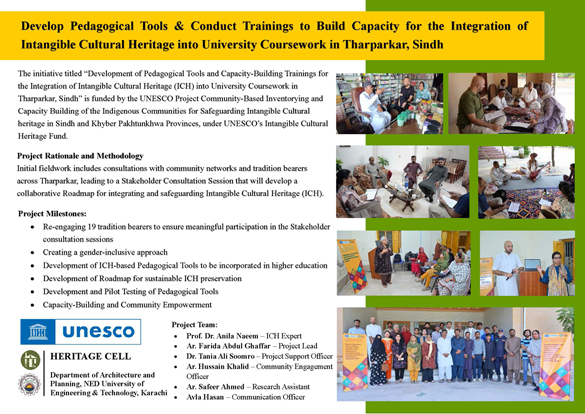
| DAP Home Page | Back |
Develop Pedagogical Tools & Conduct Trainings to Build Capacity
for the Integration of
Intangible Cultural Heritage into University Coursework
in Tharparkar, Sindh
Project Overview
The initiative titled “Development of Pedagogical Tools and Capacity-Building
Trainings for the Integration of Intangible Cultural Heritage (ICH) into
University Coursework in Tharparkar, Sindh” funded by the UNESCO Project
Community-Based Inventorying and Capacity Building of the Indigenous Communities
for Safeguarding Intangible Cultural heritage in Sindh and Khyber Pakhtunkhwa
Provinces, under UNESCO’s Intangible Cultural Heritage Fund. The project builds
directly upon the outcomes of our preceding project, “Community-Based
Inventorying of Intangible Cultural Heritage in Tharparkar, Sindh” (July 2022 –
February 2023). The earlier project successfully documented 19 ICH elements,
providing the team with substantial experience in community engagement,
participatory documentation, and effective communication with local cultural
practitioners across Tharparkar.
• Prof. Dr. Anila Naeem – ICH Expert
• Ar. Farida Abdul Ghaffar – Project Lead
• Dr. Tania Ali Soomro – Project Support Officer
• Ar. Hussain Khalid – Community Engagement Officer
• Ar. Safeer Ahmed – Research Assistant
• Ayla Hasan – Communication Officer
• Anila Rahim – Data Manager
Project Rationale and Methodology
The current phase focuses on the development of pedagogical resources to facilitate the incorporation of ICH into higher education curricula and on conducting capacity-building trainings for relevant stakeholders. Initial fieldwork involves individual and group consultation meetings with pre-established community networks and tradition bearers in Mithi, Pabohar Village, Tabbho Meghwar, Islamkot, Nagar Parkar, and surrounding areas. These consultations precede a Stakeholder Consultation Session, designed to consolidate insights and foster participatory planning. Notably, most of the tradition bearers associated with the previously documented 19 ICH elements have been re-engaged to ensure their sustained and meaningful participation.

Development and Pilot Testing of Pedagogical Tools
Subsequent to the consultation, the project will develop three to four digital pedagogical tools, supported by supplementary instructional materials, including lecture outlines, PowerPoint presentations, experiential learning exercises, fieldwork proposals, cultural mapping activities, and case study assignments. These materials will be tested through a Teachers’ TrainingThe third milestone will be focused on teacher training and pedagogical pilot testing. The final component entails a two-day Capacity-Building Workshop for 10–15 community participants, including artisans and tradition bearers, with a deliberate emphasis on gender balance. This workshop will aim to enhance heritage-based entrepreneurial competencies, facilitate access to markets and institutional support, and strengthen participants’ confidence in promoting and economically benefiting from their cultural expressions.
Instagram links for the images:
https://www.instagram.com/p/DQCjRINDEgW/?igsh=MWtxYnNwbXZ4NWtzMw==
https://www.instagram.com/p/DQRriTxjNwn/?igsh=cTJycGxldW5zdGpo